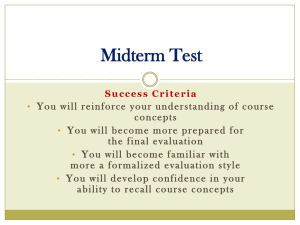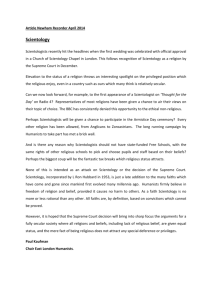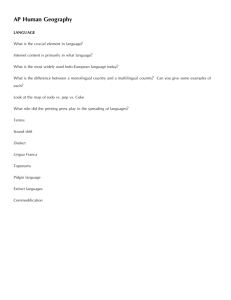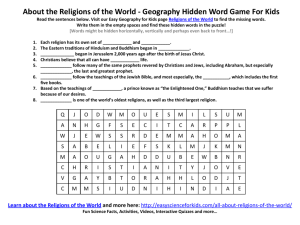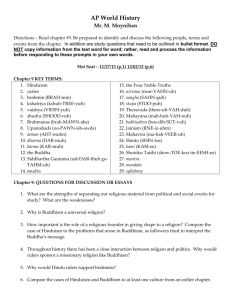205-1-2 Defining religion
advertisement
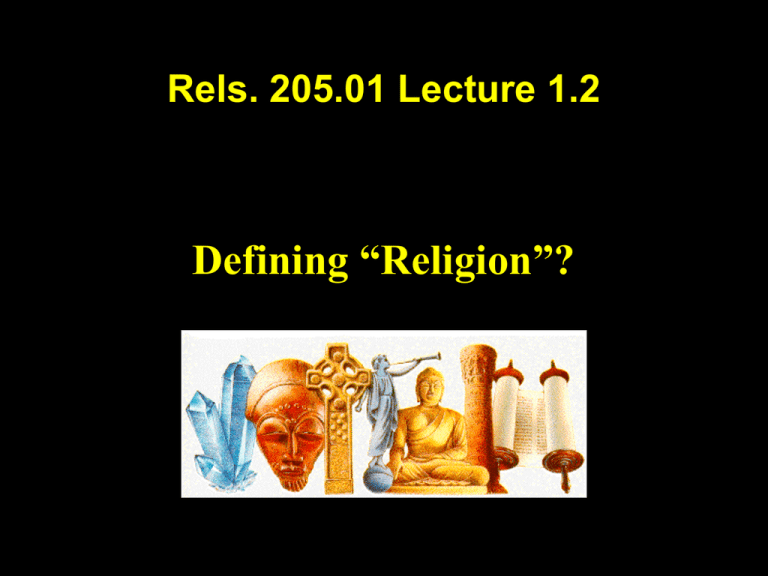
Rels. 205.01 Lecture 1.2 Defining “Religion”? Study Information You can find this on the website at: http://www.ucalgary.ca/~hexham/courses/courses/rels-205/rels-205.htm Or from: http://www.ucalgary.ca/~hexham/ Read ahead Remember to read the Smart and Welbourn papers Keep checking – material may be added Check the Course Outline http://www.ucalgary.ca/~hexham/courses/courses/courses.htm Questions and Issues Will you post your Power Point Slides? Will you post lecture notes? Are you using Blackboard? What about using laptops? Cell phones in class? Tutorials and Assistance Teaching Assistance - if you need help or information: Sergey Petrov: spetrov@ucalgary.ca Lecture Outline for Part One of Rels 205.01 Week 1 Lecture 1 What is “Religion”? Lecture 2 Studying “Religion” Week 2 Lecture 1 Ritual and the Study of Religion Lecture 2 Religious Traditions Week 3 Lecture 1 Sacral Sentiments Lecture 2 The meaning of myth Week 4 Lecture 1 Arguments for Belief in God Lecture 2 Traditional Christianity Week 5 Lecture 1 Changing Worldviews Lecture 2 Review Week 6 Reading Week Week 7 Lecture 1 First in class test This book is required for the final assignment and as background reading throughout the course. It will be on sale in class today and next week for $20 Richard Fletcher The Barbarian Conversion Richard Fletcher (1944-2005) Readings on Religion Ninian Smart (1927-2001) “Meaning in religion and the meaning of religion” http://www.ucalgary.ca/~hexham/courses/Courses2006/Rels-205/readings/smart-religion.html Fred Welbourn (1912 - 1986) “Towards a Definition of Religion” http://www.ucalgary.ca/~hexham/courses/C ourses-2006/Rels-205/readings/fred1.html Is Scientology a Religion? Scientology New Centre in Berlin in the news January 2007 Not a religion – German Government Founded by in 1955 L. Ron Hubbard (1911-1976) Science fiction writer Dianetic (1951) Is Scientology a Religion? “Scientologists in German push” By Tristana Moore BBC News, Berlin, Saturday, 13 January 2007 What is Scientology? Aims at increasing individual abilities through a rigorous practice based on a rich mythology found in Hubbard’s writing. A form of confession using an e-meter, yoga like meditation, special diets and other practices free the individual from evil influences and discover the true self or “Theatan” within. Is Scientology a REAL religion? BBC News, Saturday, 23 February, 2002, 01:55 “Scientologists face Paris ban” “The public prosecutor in France has accused the Church of Scientology of engaging in "mental manipulation" and called for it to be shut down in Paris.” What is a “real” religion? Problem of Buddhism and many traditional religions God in Buddhism The importance of dogma “Buddhists do not believe in God” Professor Paul Williams Department of Religious Studies University of Bristol What is Buddhism about? Problem of Buddhism and many traditional religions Buddhism is a religion without God as its central focus God in Buddhism The importance of dogma “Buddhists do not believe in God” Professor Paul Williams Department of Religious Studies University of Bristol The Unexpected Way (2002) Salvation in Buddhism Release from Samsara - the wheel of existence Nirvana/Nibbana In some other religions: either they have no god or God is unimportant What do we mean by “religion”? Henry Fielding (1707-1754) in Tom Jones “By religion I mean Christianity; by Christianity I mean Protestantism; by Protestantism I mean the Church of England, as established by law.” A Basic Rule of Definition Any definition of religion must apply to all groups we normally call religions and exclude those we do not call religions. Religion = belief in God or the gods Buddhism, explicitly rejects the idea of God Seeing everything as religion Paul Tillich (1886-1965) “Religion is ultimate concern.” Fred Welbourn (1912 - 1986) “Towards a Definition of Religion” http://www.ucalgary.ca/~hexham/courses/Courses2006/Rels-205/readings/fred1.html Stark’s Definition of Religion Religion refers to systems of general compensators based on supernatural assumptions. Rodney Stark (1940-) Emile Durkheim’s Definition of Religion “A unified system of beliefs and practices relative to sacred things.” Emile Durkheim (1858-1917) Jacob Wilhelm Hauer (1881-1962) “The deepest and most consequential insights are not the products of thought but of ‘revelations’ … ‘powerful inner experiences’ that convince the hero of ‘being grasped by a power or possessed by God …” Inaugural lecture 1921 Max Weber (1864-1920) “To say what it is, is not possible … the essence of religion is not even our concern, as we mike it our task to study the conditions and effects of a particular type of social behavior.” Immanuel Kant (1724-1804) “The recognition of all our duties as divine commands.” Definitions of Religion BERGER, Peter - "the human enterprise by which a SACRED cosmos is established." FRAZER, James - "a propitiation or conciliation of powers superior to man which are believed to direct or control the course of NATURE and human life." HEGEL, George - "the knowledge possessed by the finite mind of its NATURE as ABSOLUTE mind." JAMES, William - "the BELIEF that there is an unseen order, and that our supreme GOOD lies in harmoniously adjusting ourselves thereto." More Definitions of Religion MARX, Karl - "the SELF-conscious and SELF-feeling of man who has either not found himself or has already lost himself again... the general theory of the world... its logic in a popular FORM... its moral sanction, its solemn completion, its universal ground for consolation and justification. It is the fantastic realization of the human essence..." SCHLEIERMACHER, Friedrich - "a feeling for the infinite" and "a feeling of ABSOLUTE dependence.“ WHITEHEAD, Alfred North - "what the individual does with his own solitariness." How do we define religion? Kant Philosophy Durkheim Sociologically Marx Historically Frazer Anthropologically James Psychologically Schleiermacher Religiously Each according to his own discipline/interests Self-created religion “My mind is my Church” Tom Paine (1737-1809) Private Religion “Blue Cheese Cult” The Origins of Cheese The Social Context: amaNazarites Seeking A Practical Solution A set of institutionalised rituals identified with a tradition and expressing and/or evoking sacral sentiments directed at a divine or trans-divine focus seen in the context of the human phenomenological environment and at least partially described by myths or by myths and doctrines.

